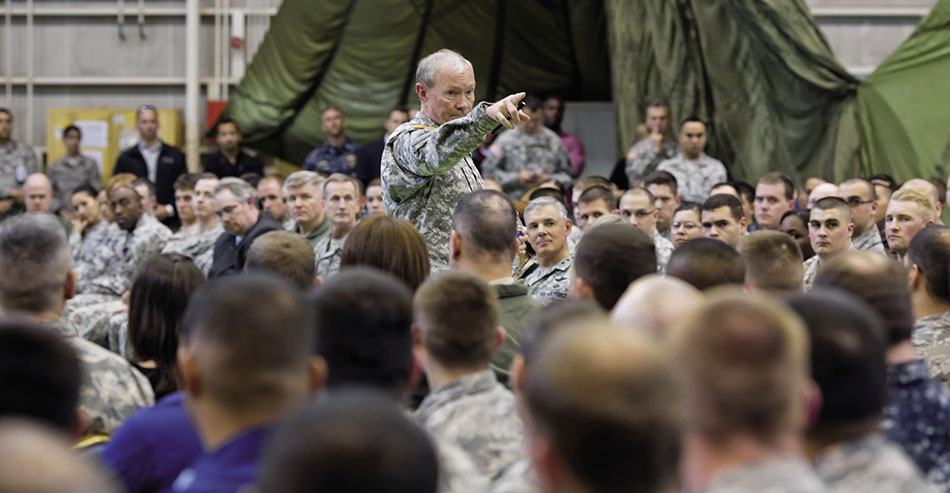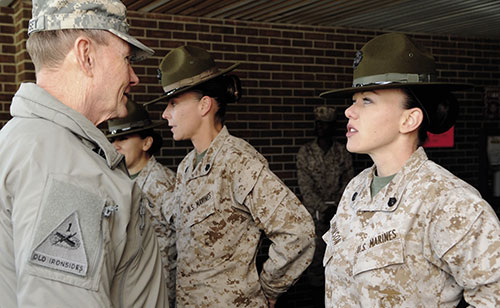The Joint Force remains unrivaled. We deter threats, assure partners, and defeat adversaries. We are strong—and our nation is secure—because we commit to being the best led, best trained, and best equipped force as our non-negotiable imperative. You, the men and women of the Joint Force—all volunteers—are the Nation’s qualitative military edge. We are who we are because of your commitment and determination. The world is not getting any safer, but we are becoming more adaptable.
We are facing three transitions—to a different force posture, to a smaller defense budget, and for some, to civilian life. We can only lead through these transitions with the trust of the force, our families, and the American people. This midpoint of my term as the 18th Chairman prompts an assessment of our work so far and informs the work we still have to do. I would like to update you on my focus areas and how I intend to guide our activities for the next 2 years. It builds on what you have already accomplished. I am confident that, together, we can fortify the foundation for the future force.

Chairman addresses U.S. Servicemembers during town hall event at Yokota Air Base, Japan, regarding importance of maintaining strong bilateral ties to ensure security throughout Asia-Pacific region (U.S. Air Force/Yasuo Osakabe)
Achieve Our National Military Objectives
At its core, our military keeps the Nation free from coercion. Whether at home or deployed, the Joint Force deters adversaries, protects our critical infrastructure, preserves the free flow of commerce, responds to crisis, and builds partner capabilities. The Joint Force’s enduring power comes from our ability to balance our response, rotation, and reset activities. Despite the current budget uncertainty, we must prioritize threats, articulate risk, and allocate resources in support of a systematic and sustainable strategy. We have to provide the Nation options. These options depend on the creativity of our people, the readiness of our forces, and the risk we are willing to underwrite.
Achieving our national military objectives also requires that we develop and evolve our relationships with our interagency and international partners. The cooperative practices we establish will play a large part in our success. The lessons we learned during the past 12 years are being applied today and will help us adapt to the challenging days ahead. The combat-tested quality of the force—from battlefield leaders to combatant commanders—will continue to guarantee U.S. security over the next 2 years.
Develop Joint Force 2020
The Joint Force of tomorrow must be able to achieve our national security objectives against a threat that is increasingly difficult to define, even as we reduce budgets. We must use this period of transition to renew our commitment to the cornerstone of our military advantage—innovation and leader development. We need to reassess what capabilities we need most, rethink how we develop and aggregate the Joint Force, and reconsider how we fight together. We must develop a research and development strategy that maximizes our ability to nurture promising technologies and to rapidly and efficiently build them out into the force.
Fundamental to Joint Force 2020 is interoperability. Our capabilities, tactics, techniques, procedures, and terminology must translate across the Services, the interagency, and with our partner nations. Becoming the force of the future demands that we develop, test, and refine concepts for the future fight. We must mobilize the entire Joint Force Development enterprise to forecast those capabilities. We know that we will be a smaller force and that we must adapt to be increasingly agile. Our task is to carry forward those lessons learned from yesterday into the context of today.
Renew Our Commitment to the Profession of Arms
Our profession is grounded in our sacred oath to defend the Constitution. We remain committed to defending the Nation and the values it has pursued for more than 200 years. We must hold true to these enduring values of service even as we remake our force and its capabilities. Our force is as diverse and rich in experience as it has ever been. Twelve years of war have created a generation of leaders experienced in joint and interagency operations. The future force will require the skills and knowledge of both our battle-tested veterans and the contributions of new Servicemembers who bring fresh skills and perspectives to new ways of warfare.

General Dempsey talks with U.S. Marine Corps drill instructors at 4th Recruit Training Battalion, Parris Island (DOD/Charles Marsh)
The cornerstone of service must remain dignity and respect among all members of the force. The mortar is leadership. We must set the example of extraordinary character and exceptional competence at every echelon. We must seek and share best practices to combat sexual assault, suicide, and high-risk behaviors. We will implement 360-degree reviews for all general and flag officers on the Joint Staff to make us aware of our strengths and weaknesses and enable us to grow as leaders of the Joint Force. These reviews serve as overt reminders of the uncompromising standards of our conduct and the enduring tenets of our oath. We contribute to our profession by reinforcing these principles every day.
The ethical decisions and proper behavior of each member of the Joint Force mold our professional reputation. Each one of us—from the private to the general—represents the whole of our profession. Our actions speak louder and echo longer than our words.
Keep Faith with Our Military Family
We keep faith with the Nation by making sure the Joint Force is the best led, best trained, and best equipped in the world, ready to meet any mission. The health and well-being of our people is critical to our national security and the future of the force.
We must prioritize and synchronize our support to reflect the needs of today’s military family, which is as diverse as the Nation it serves. We must ensure we are investing in the right services at the right time while adapting for the future needs of the force. We are committed to being upfront and honest about the tough choices we face and the changes that will occur, as they affect our people personally.
We must also consider what our military means to the people it protects—our fellow citizens—and how the last 12 years have had an impact on the way we relate to them. On our part, we must actively dispute labels often applied too generally across the force and inform a richer conversation about the character of those who volunteer to serve. We also have a duty to the Nation to listen. Our fellow citizens have different perspectives that we need to hear and understand. Military service is about stability, meaning, and variety, and we must continue to inspire those who will volunteer to serve in the future.
I have been impressed with what the Joint Force has accomplished in my 2 years as Chairman, over 12 years of war, and throughout my 39 years of military service. But there is more work to be done, and I need your help to do it. Together, we can ensure we remain the most respected profession, the global leader, and the Nation’s strength.
I’m proud to serve with you. JFQ
MARTIN E. DEMPSEY
General, U.S. Army
Chairman of the Joint Chiefs of Staff